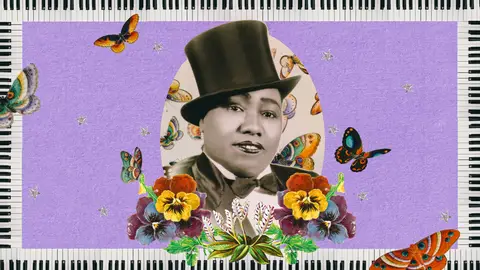Name a Woman: Pioneering Drag King Gladys Bentley

In honor of Women’s History Month, NewNowNext is spotlighting five LGBTQ women whose contributions to society and culture changed the course of history. By the end of this week, you’ll be able to name a woman—and an LGBTQ pioneer, no less—without breaking a sweat.
Gladys Alberta Bentley was born on August 12, 1907, which makes her a Leo. I won’t pretend to know enough astrology to deduce any meaning from this, but it felt important to note. As a newly out bisexual Black woman, I want to learn about all the queer Black people before me who were brave enough to be who they were publicly, even when the risks of living out-and-proud were violence, abandonment, and death. Who I get to be now is possible because of people like Bentley.
The question remains: Who was Gladys Bentley? A complete and total badass, and a blues singer and pianist during New York City's Harlem Renaissance, wherein the neighborhood became a Black cultural mecca from the 1910s to mid-1930s. Bentley began to perform under the stage name Barbara “Bobbie” Minton. She dressed in men’s attire to play piano in places like Harry Hansberry’s Clam House in Harlem. She was so successful that she toured the country, eventually increasing her earnings from $35 per week plus tips to $125 before eventually being able to afford servants at a $300-a-month apartment.
In a top hat and tuxedo, Bentley bent gender norms and entertained many with her piano playing and singing. For a time, she was one of the most notable lesbian figures in NYC, according to The New York Times. Her songs were fun, dirty, and self-assured. Her voice was deep, commanding, and said to resemble a horn.
In 1933, Bentley was sued by Hansberry and Nat Palein, who wanted to stop her from taking her standard performances at nightclubs to Broadway because they claimed she owed them five years on the contract. The singer, however, was ready to leave them at the height of the club’s success.
Gladys Bentley circa 1940.
Bentley went on to try Broadway anyway but was turned away by police, who boarded up the venues where she was to take the stage due to complaints about the raunchiness of her performances. Unable to perform on The Great White Way, Bentley returned to Harlem a year later and performed at the Ubangi Club until its closing in 1937. Her career success became harder to maintain when NYC’s speakeasy scene began to decline, prompting her to move to southern California. There, she needed to have paperwork just to be allowed to perform in men’s clothing.
Despite initially claiming to have married a white woman in a civil ceremony in 1931 and identifying as a lesbian, during the McCarthy Era, Bentley radically shifted her gender presentation, wearing dresses and eventually marrying a man named J. T. Gipson. Gipson died in 1952; that same year, Bentley married a cook named Charles Roberts, who would later deny their marriage.
Most of the stories surrounding these abrupt shifts in Bentley’s public-facing life don’t mention the fear she likely felt during her lifetime—and the pressure she likely encountered to choose heteronormativity. Before her death from pneumonia at the age of 52, Bentley appeared by most accounts to be very bold and confident. At the peak of her career, the singer was said to have overtly flirted with women during her performances, even inviting them to offer up their own dirty lyrics as she sang. However, there are also reports of Bentley’s talk of “cures” for her homosexuality in an essay for Ebony magazine, and her studies to be a minister.
While I am loath to ignore her autonomy in doing so, I wonder if Bentley would have made the same choices today. I don’t believe so. The fact remains, Bentley was a celebrated, provocative performer during a moment in NYC history where creativity and talent was abundant. And she did all of this as a Black queer woman.
In the early 1960s, Malcom X said, “The most disrespected person in America is the Black woman. The most unprotected person in America is the Black woman. The most neglected person in America is the Black woman.” Those words rang true when he first said them, and they still resonate today. When Bentley got on that stage every night to sing, play piano, and openly flirt with other women, she joined a legacy of trailblazers who gave Black queer women the courage to be who we are unapologetically.
Thank you, Gladys Alberta Bentley. Almost 90 years down the line, I aim to make you just as proud.





